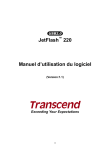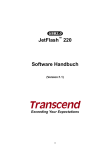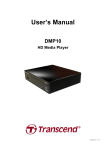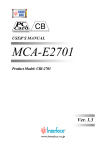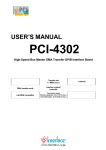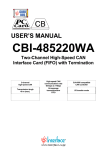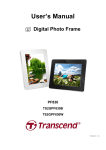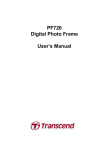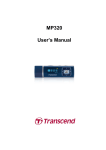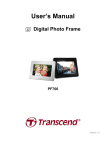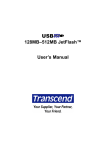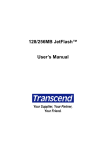Download JetFlash 220 Software User's Manual
Transcript
JetFlash™ 220 Software User’s Manual (Version:1.0) 0 Table of Contents Table of ContentsIntroduction ..............................................................................................1 Introduction ............................................................................................................................2 Features.............................................................................................................................................2 System Requirements........................................................................................................................2 Usage Considerations............................................................................................................3 General Use.......................................................................................................................................3 Backing Up Data ................................................................................................................................3 Reminders..........................................................................................................................................3 Connecting to a Computer ....................................................................................................4 Disconnecting from a Computer ...........................................................................................5 Removing the JetFlash™ 220 in Windows® 2000﹐XP and VistaTM ...................................................5 Setting Up the Software .........................................................................................................6 JetFlash™ 220 Secure Login................................................................................................11 Password Bank Manager .....................................................................................................14 Protect Files..........................................................................................................................16 Protect Files .....................................................................................................................................16 Unprotect Files.................................................................................................................................19 Search Protected Files.....................................................................................................................22 Mobile Favorites ...................................................................................................................25 Open “Mobile Favorites” ..................................................................................................................25 Export My Favorites .........................................................................................................................26 Website Auto-Login..............................................................................................................28 System Settings ...................................................................................................................30 System Settings ...............................................................................................................................30 Fingerprint Manager.........................................................................................................................31 General Settings ..............................................................................................................................33 Rescue Password ............................................................................................................................34 Password Bank Manager.................................................................................................................35 Backup User Authentication File......................................................................................................36 Restore User Authentication File .....................................................................................................38 Repartition Tool ....................................................................................................................41 Troubleshooting ...................................................................................................................45 Specifications .......................................................................................................................47 Ordering Information............................................................................................................47 Transcend Limited Warranty ...............................................................................................48 Terminology..........................................................................................................................49 1 Congratulations on purchasing Transcend’s JetFlash™ 220. This tiny, Ultra-portable, Hi-Speed USB2.0 storage device is the perfect data management system for uploading, downloading, storing and transferring your vital data and information to any desktop, or notebook computer. The JetFlash™ 220 is a unique Hi-Speed USB 2.0 Flash Drive that plugs directly into your desktop, or notebook computer and incorporates the latest Fingerprint Recognition Technology, so now you can securely store your files, folders, documents, photos, music and e-work with the utmost confidence. In addition, the JetFlash™ 220 comes bundled with very useful software that can (used in Windows® 2000/XP/VistaTM) increase your productivity. The JetFlash™ Software Pack includes Protect Files, Mobile Favorites, Website Auto-Login and Repartition Tool. This Software User’s Manual will help you get the most from your new device, please read it in detail before using the JetFlash™ 220. Features • Fully compatible with Hi-Speed USB 2.0 • Advanced Fingerprint Recognition Technology • Easy Plug and Play installation • Additional software pack (helps you manage your data) • Protect Files: Protect files stored on your computer using fingerprint security • Mobile Favorites: Access your Internet Explorer Favorites on another computer • Website Auto-Login: Automatically login to websites where you are a registered user • Repartition Tool: Adjust the size of the Private and Public partition areas for storing data • USB powered. No external power, or battery needed • LED indicates data transfer activity • Driverless (for Windows® 2000/XP/VistaTM) System Requirements Desktop or notebook computer with a working USB port. The JetFlash™ 220 can only be used in a computer running the following Operating Systems (OS): • Windows® 2000, Microsoft® Internet Explorer (IE) • Windows® XP, Microsoft® Internet Explorer (IE) • Windows® VistaTM, Microsoft® Internet Explorer (IE) 2 Introduction Introduction Introduction Usage Considerations Figure 1. JetFlash 220 WARNING! The sensor strip on the JetFlash™ 220 is sensitive to physical damage, avoid squeezing, or scratching your JetFlash™ 220 with any hard or sharp object. When not in use, or during transportation always ensure that the devices’ protective cover is on. General Use • The JetFlash™ 220 comes with bundled software and can only be used with a computer that is running Windows® 2000, XP or VistaTM. • Each time you plug the JetFlash™ 220 into your computer it will install a new Local Disk containing setup information. Do NOT attempt to edit, delete, or modify any of the information on this disk. • Ensure that you make and save a Backup User Authentication File of your JetFlash™ 220 Fingerprint user information to your computer. Backing Up Data • Transcend does NOT take any responsibility for data loss, or damage during operation. If you decide to store data on your JetFlash™ we strongly advise that you regularly backup the data to a computer, or other storage medium. • To ensure High-Speed USB 2.0 data transfer rates when using your JetFlash™ 220 with a computer, please check the computer has the relevant USB drivers. If you are unsure on how to check this, please consult the computer or motherboard User’s Manual for USB driver information. Reminders Always follow the procedures in the “Disconnecting from a Computer” section to remove your JetFlash™ from a computer. 3 Usage Considerations These usage and safety guidelines are IMPORTANT! Please follow them carefully. Connecting to a Computer 1. Plug the JetFlash™ 220 directly into an available USB port on your desktop, or notebook computer. Figure 2. Connecting to a computer 2. When the JetFlash™ 220 is successfully connected to a computer the unit’s LED will light up. A new Removable Disk drive with a newly assigned drive letter representing the JetFlash™ and a new Local icon and Fingerprint Application Suite icon will appear on the Windows System Tray. Figure 3. **F & G: are example drive letters, the letters in your "My Computer" window may differ 3. Once you are successfully logged in to Identity Authorization window you can download data to the JetFlash™ 220 simply by dragging and dropping files, or folders onto the Removable Disk drive letter that represents the JetFlash™ 220. Do NOT attempt to edit, delete, or modify any of the information on this disk. 4 U Use with a Computer Disk* containing setup information will appear in the My Computer window. In addition, a Hardware Disconnecting from a Computer When you are finished using the JetFlash™ 220 always click on the Finish option in the Fingerprint Application Suite to end the session properly. 1. Right click on the “Fingerprint Application Suite” icon on the Windows System Tray and select the “Finish” option. Figure 4. Finish Removing the JetFlash™ 220 in Windows® 2000﹐XP and VistaTM 1. Select the Hardware icon on the system tray. 2. The Safely Remove Hardware pop-up window will appear. Select it to continue. Figure 5. Safely Remove Hardware 3. A message window will appear stating, “The ‘USB Mass Storage Device’ device can now be safely removed from the system.” Figure 6. Safe to Remove Hardware WARNING! To prevent data loss, always use this procedure to remove the JetFlash™ from Windows® 2000, XP and VistaTM. 5 Use with a Computer NEVER disconnect the JetFlash™ from a Computer when its LED is flashing. Setting Up the Software CAUTION! Before using the JetFlash™ 220 for the first time you must setup the units’ application software in the System Setup Wizard. The JetFlash™ 220 comes bundled with some very useful software that can be used to manage your data and increase your productivity. Before using the JetFlash™ 220 for the first time, please ensure that you setup the JetFlash™’s application software; this will ensure that you get the maximum benefit from your JetFlash™ 220. 1. Plug the JetFlash™ 220 directly into an available USB port on your desktop, or notebook computer. 2. Before using the JetFlash™ 220 for the first time you must setup the JetFlash™’s application software Figure 7. Run the System Setup Wizard first 3. The System Setup Wizard window will appear and guide you through the setup process. Please follow the on-screen instructions to complete setting up the JetFlash™ application software. Click on the “Next” button to continue. Figure 8. System Setup Wizard 6 Software Setup in the System Setup Wizard. If you try to use JetFlash™ 220 without setting up the software you will be prompted with the “run the System Setup Wizard now?” message window. Click on the “Yes” button to start the System Setup Wizard. 4. The Wizard will prompt you with two options. Option one is to create a New User account. Option two Figure 9. Create a New User Account 5. Input a “Device User Name,” this can be a combination of letters and numbers only (no spaces). Input a “Password” and “Confirm Password.” Click on the “Next” button to continue. Figure 10. Enter a device name and password Entering a password gives you the option of using a secret password, or your fingerprint to access secure data. 7 Software Setup gives access to previously saved User Authentication. If this is your first time using the JetFlash™ 220 select option one by clicking on the “I want to create a new User Authentication File” radio button. Click on the “Next” button to continue. 6. Click on the finger, or thumb you want to use to setup the fingerprint software. To view a flash tutorial on how to properly slide your finger, or thumb along the JetFlash™ 220’s sensor strip click on the Figure 11. Select a finger, or thumb to setup the fingerprint software 7. Setting up the fingerprint software involves sliding the selected finger, or thumb along the JetFlash™ 220’s sensor strip three times to register your fingerprint information. Please be patient when you are performing this procedure, as it may take a few attempts to register your fingerprint profile. A properly registered fingerprint will display the icon; a retry will be signaled by the Figure 12. Fingerprint registration requires 3 successful scans 8 icon. Software Setup icon. 8. After you successfully scan your fingerprint three times the wizard will give you the option of choosing Figure 13. Select another finger/thumb, or click on the next button 9. Backup your User Authentication, Password and Fingerprint information in the form of a *.dat file to the pre-specified location, or select a location by clicking on the “Save As” button. Click on the “Next” button to continue. A “Backup Successful” message window will appear, click on the “OK” button to close the window. Figure 14. Select a location for your Backup *dat file 9 Software Setup another finger/thumb (you can save all of your fingerprints), or click on the “Next” button to continue. 10. A “Congratulations!” message window will appear to signify the end of the setup process. Click on Figure 15. Congratulations, click on Finish to exit the setup 10 Software Setup the “Finish ” button to complete the setup process and exit the System Setup Wizard. JetFlash™ 220 Secure Login To access data and information, or change any of the settings on your JetFlash™ 220 you will need to login to the Identity Authorization window. The login window will appear when you plug in the JetFlash™, or anytime you try to access the JetFlash™ 220’s functions. 1. Right click on the “Fingerprint Application Suite” icon on the Windows System Tray. Select any of the options. Figure 16. JetFlash 220's Functions 2. The Identity Authorization window will appear. Enter your fingerprint, or secret password to access Fingerprint Login the JetFlash™ 220’s specific function. Figure 17. Identity Authorization Login 11 3. To login using your fingerprint; slide a pre-registered finger/thumb along the JetFlash™ 220’s sensor strip. If the sensor cannot get a good fingerprint reading, the “Insufficient fingerprint” message window will appear and you will have to rescan your fingerprint, or enter your secret password. Figure 18. Insufficient Fingerprint window Fingerprint Login 4. An incorrect, or unrecognized fingerprint scan will result in the “Verification failed” message window. Figure 19. Verification Failed 5. A successful fingerprint login will allow you to begin using the selected JetFlash™ 220’s feature. Figure 20. Fingerprint verification successful 12 6. To login using your secret password; simply input your password in the Rescue Password space. Figure 21. Input Secret Password Fingerprint Login 7. An incorrect password will result in the “Invalid Password” message window. Figure 22. Invalid Password 8. A successful password login will allow you to begin using the selected JetFlash™ 220’s feature. 13 Password Bank Manager The Password Bank Manager provides a shortcut to the database, which contains your Username and Password profiles for any registered website accounts you have selected to save to the JetFlash™ 220. You can Delete, Rename and view information about the websites’ content. The Password Bank Manager can only be accessed by logging in to the Identity Authorization window using your fingerprint, or secret password. 1. To open the Password Bank Manager, right click on the “Fingerprint Application Suite” icon on the Windows System Tray and select the “Password Bank Manager” option. Figure 23. Fingerprint Application Suite 2. The Identity Authorization window will appear. Enter your fingerprint, or secret password to access Figure 24. Identity Authorization Login 14 Password Bank Manager the Password Bank function. 3. Password Bank Manager allows you change Website Auto-Login information including, when you point the mouse at the login area of a registered website account, the Identity Authorization Login window will appear. After you successfully login your registered Username and Password will automatically be inserted by the JetFlash™. Figure 25. Password Bank Manager 4. To Delete, Rename, or view the Content information of a saved website right click on the site in the Password Bank Manager Password Bank Manager window and select an option from the drop down menu. After making any modifications click on the “Apply” button to save the changes. Figure 26. Registered website management 15 Protect Files The JetFlash™ 220’s Protect Files feature allows you to securely protect files that are stored on your computer. Protected files can only be accessed by logging in to the Identity Authorization window using your fingerprint, or secret password. This section contains information on; • Protect Files • Unprotect Files • Search Protected Files Protect Files 1. To Protect a file(s) right click on the file/folder you want to protect, or right click on the “Fingerprint Application Suite” icon on the Windows System Tray and select “Protect files.” In the drop Figure 27. Selecting the Protect file option 2. The Identity Authorization window will appear. Enter your fingerprint, or secret password to access the Protect files function. Figure 28. Identity Authorization Login 16 Protect Files down menu select the “Protect files” option. 3. After entering the correct password/fingerprint, the Protect files window will appear. If not already checked, then check the file(s) you want to protect, or select all of the files in the window by clicking on the “Select All” button. Figure 29. Selecting files for protection 4. You can add files to the list by clicking on the “Browse” button. After selecting all of the files you want Protect Files to protect, click on the “Start” button to begin protecting the files. Figure 30. Browse for files and Start file(s) protection 17 5. After the Protect files process has finished a report will be produced. Any file that failed to be protected will show up in the report with an ‘X’ in the folder column and as ‘Failed’ in the status column. A file with a Failed status has NOT been protected and you will need to go through the Protect files process again. Figure 31. Protect files report Protect Files 6. Click on the “Finish” button to complete and exit Protect files. Figure 32. Finish Protect files 18 Unprotect Files 1. To Unprotect a file(s) right click on the protected file/folder and select “Unprotect file.” Alternatively, you can right click on the “Fingerprint Application Suite” icon on the Windows System Tray and select “Protect files.” In the drop down menu select the “Unprotect files” option. Figure 33. Selecting the Unprotect file option 2. The Identity Authorization window will appear. Enter your fingerprint, or secret password to access Protect Files the Unprotect files function. Figure 34. Identity Authorization Login 19 3. After entering the correct password/fingerprint, the Unprotect files window will appear. If not already checked, then check the file(s) you want to protect, or select all of the files in the window by clicking on the “Select All” button. Figure 35. Selecting files to Unprotect 4. You can add files to the list by clicking on the “Browse” button. After selecting all of the files you want Protect Files to unprotect, click on the “Start” button to begin to unprotect the files. Figure 36. Browse for files and Start to unprotect a file(s) 20 5. After the Unprotect files process has finished a report will be produced. Any file that failed to be Unprotected will show up in the report with an ‘X’ in the folder column and as ‘Failed’ in the status column. A file with a Failed status has NOT been Unprotected and you will need to go through the Unprotect files process again for that file(s). Figure 37. Unprotect files report Protect Files 6. Click on the “Finish” button to complete and exit Unprotect files. Figure 38. Finish Unprotect files 21 Search Protected Files 1. To search for files that have been protected, right click on the “Fingerprint Application Suite” icon on the Windows System Tray and select “Protect files.” In the drop down menu select the “Search Protected files” option. Figure 39. Fingerprint Application Suite 2. The Identity Authorization window will appear. Enter your fingerprint, or secret password to access Figure 40. Identity Authorization Login 22 Protect Files the Search Protected files function. 3. After entering the correct password/fingerprint, the Search protected files window will appear. Select the disk you want to search in the left column and click on the “Search” button to begin searching the disk for protected files. Figure 41. Search Protected Files 4. A list of the protected files and their locations will be listed in the Search protected files window. Click Protect Files on the Search completed “OK” button to continue. Figure 42. Search Completed 23 5. A protected file can be deleted by right clicking on the file in the Search protected files window and selecting the “Delete” option. Complete, or cancel the deletion of the file by clicking on the “Yes,” or “No” button. Figure 43. Delete Protected Files Protect Files 6. Click on the “Finish” button to complete and exit Search protected files. Figure 44. Finish Search protected files 24 Mobile Favorites The Mobile Favorites feature allows you to save your Internet Explorer Favorites to the JetFlash™ 220. The advantage of this feature is that you can plug your JetFlash™ 220 into another computer and open an Internet Explorer session that will automatically contain a list of your personal favorites. This section contains information on; • Open “Mobile Favorites” • Export My Favorites Open “Mobile Favorites” 1. To use the Mobile Favorites feature, right click on the “Fingerprint Application Suite” icon on the Windows System Tray and select “Mobile Favorites.” In the drop down menu select the “Open ‘Mobile Favorites’” option. Figure 45. Fingerprint Application Suite 2. The first time you use the Mobile Favorites function you will need to Export My Favorites; this will Mobile Favorites save all of your Internet Explorer Favorites information to the JetFlash™ 220. Select the “Export local My Favorites” radio button and click on the “OK” button to continue. Figure 46. Export My Internet Explorer Favorites 25 3. After exporting your local Internet Explorer Favorites, each subsequent time you access the Open “Mobile Favorites” function on the JetFlash™ 220, the Internet Explorer Mobile Favorites program will open with your favorites preinstalled. Figure 47. Internet Explorer Mobile Favorites Export My Favorites 4. Use the Export My Favorites to update your Internet Explorer favorites information to the JetFlash™ 220. Right click on the “Fingerprint Application Suite” icon on the Windows System Tray and Mobile Favorites select “Mobile Favorites.” In the drop down menu select the “Export My Favorites” option. Figure 48. Fingerprint Application Suite 26 5. If Internet Favorites information files are already on the JetFlash™, you will be prompted to Confirm File Replace. Select the appropriate options and after the copying process has completed, the “Export My Favorites” has successfully completed message window will appear. Click on the “OK” button to complete and exit Mobile Favorites. Mobile Favorites Figure 49. Exported successfully 27 Website Auto-Login The Website Auto-Login feature allows you to automatically login to any website where you have a registered account. The JetFlash™ 220 will keep a secure list of all your usernames and passwords, so when you visit a website where you are a registered user, the JetFlash™ 220 will automatically log you in and when you are finished using the computer, simply remove your JetFlash™ 220 and all you passwords are erased from the computer. Website Auto-Login can only be accessed by logging in to the Identity Authorization window using your fingerprint, or secret password. 1. To use the Website Auto-Login feature, ensure the JetFlash™ 220 is plugged into the computer you are using. Go to a website where you have a registered account and enter your Username and Password. The “Password Bank” message window will appear requesting whether you want to save the Username and Password information. Click on the “Yes” button to continue. Figure 50. Save Username & Password? 2. The Identity Authorization window will appear. Enter your fingerprint, or secret password to access Figure 51. Identity Authorization Login 28 Website Auto-Login the Website Auto-Login function. 3. The Password Bank window will appear containing information about the website name and registration information. Click on the “Enroll” button to save the registration information to the JetFlash™. Figure 52. Save website registration information to the JetFlash successfully” message window will appear. Click on the “OK” button to complete and exit the Website Auto-Login. Figure 53. Saved successfully 29 Website Auto-Login 4. After the website Username and Password have been saved to the JetFlash™, the “Saved System Settings You can change the JetFlash™ 220’s settings by entering the System Settings in the Fingerprint Application Suite. System Settings can only be accessed by logging in to the Identity Authorization window using your fingerprint, or secret password. This section contains information on; • System Settings • Backup User Authentication File • Restore User Authentication File System Settings System Settings allows you to change operational information on the JetFlash™ 220 using; • Fingerprint Manager • General Settings • Rescue Password • Password Bank Manager 1. To modify the System Settings, right click on the “Fingerprint Application Suite” icon on the Windows System Tray and select “System.” In the drop down menu select the “System Settings” option. 2. The Identity Authorization window will appear. Enter your fingerprint, or secret password to access the System Settings. Figure 55. Identity Authorization Login 30 System Settings Figure 54. Fingerprint Application Suite 3. The System Settings menu window will appear. Select the setting that you want to change by clicking on the tabs marked, Fingerprint Manager, General Settings, Rescue Password and Password Bank Manager. Figure 56. System Settings Menu Fingerprint Manager 1. Click on the finger, or thumb you want to add as a recognized fingerprint. To view a flash tutorial on how icon. System Settings to properly slide your finger, or thumb along the JetFlash™ 220’s sensor strip click on the Figure 57. Add a finger, or thumb for fingerprint recognition 31 2. As described in the “Setting Up the Software” section, slide the selected finger, or thumb along the JetFlash™ 220’s sensor strip three times to register your fingerprint information. Click on the “Apply” button to confirm the new Fingerprint settings. Figure 58. Apply new Fingerprint settings 3. Clicking on a finger, or thumb that has already been setup as a recognized Fingerprint will delete the System Settings finger/thumb profile from the database, so it is no longer recognized by the Identity Authorization Login as a valid fingerprint. 32 General Settings 1. General Settings allows you to modify the methods used to login to the JetFlash™ 220, you can select whether to include the Secret Password login in the Identity Authorization Login window. You can also select to display an image of the finger(s) that have been saved as valid fingerprints in the Identity Authorization Login window. Click on the “Apply” button to confirm the new General settings. System Settings Figure 59. General Settings 33 Rescue Password 1. Rescue Password allows you to change the Backup Account name and Password. Click on the “Apply” button to confirm the new Rescue Password settings. System Settings Figure 60. Rescue Password 34 Password Bank Manager 1. Password Bank Manager allows you change Website Auto-Login information including, when you point the mouse at the login area of a registered website account, the Identity Authorization Login window will appear. After you successfully login your registered Username and Password will automatically be inserted by the JetFlash™. Figure 61. Password Bank Manager 2. To Delete, Rename, or view the Content information of a saved website right click on the site in the System Settings Password Bank Manager window and select an option from the drop down menu. After making any modifications click on the “Apply” button to save the changes. Figure 62. Registered website management 35 Backup User Authentication File All of the user information stored on the JetFlash™ 220 including, your User Information, Passwords and Fingerprint information can be backed up to the computer you are using in the form of a *.dat file. It is important to create a Backup User Authentication File because if the JetFlash™ 220 software ever needs to be re-installed, you will not be able to open any protected files on the computer without first restoring the user authentication file. 1. To use the Backup User Authentication File, right click on the “Fingerprint Application Suite” icon on the Windows System Tray and select “System.” In the drop down menu select the “Backup User Authentication File” option. Figure 63. Fingerprint Application Suite 2. The Identity Authorization window will appear. Enter your fingerprint, or secret password to access Figure 64. Identity Authorization Login 36 System Settings the Backup User Authentication File setting. 3. The Backup window will appear with a predefined destination folder for the Backup User Authentication File, you can change the destination folder by clicking on the “Save As” button. You can also select what information to save in the *.dat file by clicking on the radio button options. Click on the “Backup” button to begin the Backup process, or the “Finish” button to exit the Backup User Authentication File settings. Figure 65. Backup User Authentication File 4. A “Backup” has successfully completed message window will appear. Click on the “OK” button to Figure 66. Backup Successful 37 System Settings complete and exit the Backup feature. Restore User Authentication File Restoring the User Authentication file will restore the JetFlash™ 220 User Information you backed up to the computer in the form of a *.dat file. This includes restoring, User Information, Passwords and Fingerprint information, so any previously protected files on the computer can be opened. 1. The Restore User Authentication File feature can be accessed, by right clicking on the “Fingerprint Application Suite” icon on the Windows System Tray and select “System.” In the drop down menu select the “Restore User Authentication File” option. Figure 67. Fingerprint Application Suite 2. The Identity Authorization window will appear. Enter your fingerprint, or secret password to access Figure 68. Identity Authorization Login 38 System Settings the Restore User Authentication File setting. 3. The Restore window will appear. If you selected to use the predefined folder location for the Backup User Authentication File, the file will be automatically selected as the Restore file. However, if you specified a different location for the Backup User Authentication File you will have to locate and open the file by clicking on the “Open” button. Figure 69. Restore User Authentication File 4. In the Restore window, click on the “Finish” button to exit the Restore User Authentication File System Settings settings, or click on the “Restore” button to run the Restore process. A “Restore” message window will appear informing you that you must scan your Fingerprint in the Identity Authorization Login window (only your Fingerprint will be accepted, there is no facility for entering your Secret Password) to proceed. Click on the “OK” button to continue. Figure 70. Restore Fingerprint scan 39 5. After your Fingerprint is authorized the “Restore” successful message window will appear. Click on the “OK” button to complete and exit the Restore feature. System Settings Figure 71. Restore Successful 40 Repartition Tool The Repartition feature allows you to adjust the size of the two partitions on the JetFlash™ 220. The advantage of this feature is that you can customize the size of the Private and Public areas on the JetFlash™ 220 to suit your requirements. Any information saved to the Private Disk is securely protected and can only be accessed by logging in to the Identity Authorization window, the other area will remain a Public Disk, which is freely accessible. WARNING! Partitioning the JetFlash™ will erase any information on the disk. Please backup any information that you have on the drive before repartitioning the JetFlash™ 1. To use the Repartition Tool feature, plug the JetFlash™ 220 into an available USB port on your desktop, or notebook computer. 2. The Identity Authorization window will appear. Enter your fingerprint, or secret password to access the Repartition Tool function. Figure 72.Identity Authorization Login 3. Put the Software CD into the CD-ROM (Auto-Run supported). Click on the “Repartition Tool” button Repartition Tool to launch the Repartition application. Figure 73. Repartition Tool 41 4. The Partition Tool window will appear. You can customize the size of the Private and Public areas on the JetFlash™ 220 by sliding the adjustment bar to the left, or right until the Private and Public areas are the required memory size. Figure 74. Partition Tool ™ 5. After you have divided the JetFlash 220’s Private and Public areas into the required sizes, click on Repartition Tool the “Format” button to begin repartitioning the drive. Figure 75. Start Repartition 42 6. The restore confirmation window will appear after format complete. You can click “Yes” button and follow its procedures to restore User Data File (User Authentication / Password / Fingerprint information) or click “No” button to skip the restore process. Figure 76. Confirm Restore User Data 7. A “Format Complete” message window will appear confirming that the disk has been successfully Repartition Tool partitioned. Click on the “Finish” button to complete and exit the Partition Tool. Unplug and Re-plug the JetFlash™ 220 into your computer to activate the new settings. Figure 77. Partition complete 43 8. After you repartition the JetFlash™ 220’s drive, the Private partition and its contents will remain Repartition Tool invisible until you log into the Identity Authorization window. After you login any information you save to the JetFlash™ will be saved to the Private area and securely protected. If you do not log into the Identity Authorization any information you save will be saved to the Public area and freely accessible. 44 Troubleshooting If a problem occurs with your JetFlash™ 220, please first check the information listed below before taking your JetFlash™ 220 for repair. If you are unable to remedy a problem from the following hints, please consult your dealer, service center, or local Transcend branch office. We also have FAQ and Support services on our websites. Manual CD cannot auto-run in Windows® Go to the Device Manager in the Control Panel and enable the Auto-Insert function of the CD-ROM drive. Alternatively, you can manually run the “JetFlash.EXE” file on the CD. Operating System cannot detect the JetFlash™ 220 Check the following: 1. The JetFlash™ 220’s can only be used with computers that are running Windows® 2000/XP/VistaTM. 2. Is your JetFlash™ 220 properly connected to the USB port? If not, unplug it and plug it in again. If it is properly connected, try using another available USB port. 3. Is the USB port enabled? If not, refer to the user’s manual of your computer (or motherboard) to enable it. Why is my Fingerprint not being recognized by the JetFlash™ 220 The sensor strip for reading your fingerprint is very sensitive and it requires a good fingerprint scan in order to compare the scanned print with that of saved fingerprint profile. Therefore, you need to slide your finger/thumb slowly and deliberately along the strip to register a good fingerprint image. 1. Has the finger/thumb you are sliding along the strip been setup as a recognized fingerprint? If not, then set it up. 2. Are you sliding the finger/thumb too quickly across the sensor strip? Why can’t I protect System files, or “*.exe, *.ini and *.dll” files? These files cannot be protected because they are critical to the operation of your computer and must therefore always be accessible. Why can’t I use my Secret Password to Restore a User Authentication File? Why does a “Restart Computer” message window appear when I plug in my JetFlash™ 220? Sometimes the computer will mistakenly interpret the JetFlash™ 220 as a new piece of hardware that needs to be installed. You can disregard this message and click on the “Cancel” button to continue. 45 Troubleshooting The restoration of the backed up user authentication file is a critical procedure, which can allow your personal login and user authentication to be compromised. Passwords can be guessed, or stolen and that is why restoring the user authentication file will only accept your fingerprint as a valid form of recognition. Cannot find the file that was just copied to the JetFlash™ You should always open a transferred file in its new location to ensure it has transferred successfully. Re-copy the file and refer to the “Disconnecting from a Computer” section to remove the JetFlash™ 220 after the copy process is completed. A File that was just deleted still appears Troubleshooting Re-delete the file and refer to the “Disconnecting from a Computer” section to remove the JetFlash™ 220 after the delete process is completed. 46 Specifications • Size (L x W x H): 70 mm × 20.5 mm × 11 mm • Weight: 13g • Certificates: CE, FCC, BSMI • Warranty: 2-years Ordering Information Memory Capacity Lens Color TS2GJF220 2GB Orange TS4GJF220 4GB Blue TS8GJF220 8GB Red Specifications Transcend P/N 47 Transcend Limited Warranty “Above and Beyond” is the standard we set ourselves for customer service at Transcend. We consistently position ourselves to be significantly above the industry norm, which is all part of our commitment to Customer Satisfaction. All Transcend information, Inc. (Transcend) products are warranted and tested to be free from defects in material and workmanship and to conform to the published specifications. During the warranty period should your Transcend JetFlash™ 220 fail under normal use in the recommended environment due to improper workmanship or materials, Transcend will repair the product or replace it with a comparable one. This warranty is subject to the conditions and limitations set forth herein. Duration of Warranty: The Transcend JetFlash™ 220 is covered by this warranty for a period of two (2) years from the date of purchase. Proof of purchase including the date of purchase is required to collect on the warranty. Transcend will inspect the product and decide whether to repair or replace it. Transcend reserves the right to provide a functional equivalent product, or a refurbished replacement product. Limitations: This warranty does not apply to product failure caused by accidents, abuse, mishandling, improper installation, alteration, acts of nature, improper usage, or problems with electrical power. In addition, opening or tampering with the product casing, or any physical damage, abuse or alteration to the product’s surface, including all warranty or quality stickers, product serial or electronic numbers will also void the product warranty. Transcend is not responsible for recovering any data lost due to the failure of a flash device. Transcend’s JetFlash™ 220 must be used with devices that conform to the recommended industry standards. Transcend will not be liable for damages resulting from a third party device that causes the Transcend JetFlash™ 220 to fail. Transcend shall in no event be liable for any consequential, indirect, or incidental damages, lost profits, lost business investments, lost goodwill, or interference with business relationships as a result of lost data. Transcend is also not responsible for damage or failure of any third party equipment, even if Transcend has been advised of the possibility. This limitation does not apply to the extent that it is illegal or unenforceable under applicable law. Disclaimer: The foregoing limited warranty is exclusive. There are no other warranties, including any implied warranty of merchantability or fitness for a particular purpose. This warranty is not affected in any part by Transcend providing technical support or advice. Online Registration: To expedite the warranty service, please register your Transcend Product within 30 days of purchase. Register online at http://www.transcendusa.com/productregister Transcend Information, Inc. www.transcendusa.com *The Transcend logo is a registered trademark of Transcend Information, Inc. *All logos and marks are trademarks of their respective companies. 48 Warranty * The specifications mentioned above are subject to change without notice. Terminology *.dat ............................................................................................................................................8, 35, 36, 37 File extension that denotes a file, which contains data. .dll..............................................................................................................................................................45 A dynamic link library file extension allows an executable file communicate with a specific device. .exe ...........................................................................................................................................................45 An executable file contains a program. .ini..............................................................................................................................................................45 An initialization file type is used to set parameters for the OS and some programs. CD...............................................................................................................................................................45 Compact Disk. CD-ROM .....................................................................................................................................................45 Compact Disk-Read Only Memory is a compact disk format that can store music, text and graphics. database ....................................................................................................................................................13 A collection of organized information. desktop ..........................................................................................................................................1, 3, 5, 40 This is a single user stationary computer running the Window®, Mac™, or Linux™ Operating System. e-work ..........................................................................................................................................................1 Electronic Work is any data resulting from work performed on a computer, or similar system. FAQ ............................................................................................................................................................44 Frequently Asked Question. Flash Drive ..................................................................................................................................................1 A rewritable type of solid-state memory storage device. flash tutorial ..........................................................................................................................................7, 30 Animated instruction set providing information on how to use a product, or service. hotkey ..................................................................................................................................................14, 35 A button, or combination of buttons that performs a task more quickly. icon ....................................................................................3, 4, 7, 10, 13, 15, 18, 21, 24, 25, 29, 30, 36, 38 Is a small picture that represents a function, file, folder, disk drive, or some other element of a device. Internet Explorer .............................................................................................................................1, 24, 25 World wide web browser. LED.......................................................................................................................................................1, 3, 4 Light emitting diode produces light when an electric current is passed through it. notebook..............................................................................................................................................1, 3, 5 Partition ...............................................................................................................................................42, 43 A logical division of a disk giving the appearance of separating one disk into more than one memory area. radio button.....................................................................................................................................6, 24, 37 Allows a user to make a selection by clicking in the circle, or square that is provided. 49 Terminology Portable lightweight computer capable of running off of battery power. sensor strip .................................................................................................................................................7 A device that detects and responds to a stimulus i.e. touch, light, heat etc. System Tray.................................................................................3, 4, 10, 13, 15, 18, 21, 24, 25, 29, 36, 38 Provides a location on the taskbar to display icons for programs and devices. tabs ............................................................................................................................................................30 Distinguishes a user interface option, or preference. USB ............................................................................................................................................1, 2, 3, 4, 44 Universal Serial Bus is a hardware interface found on all modern computers for connecting peripherals. USB 2.0 ........................................................................................................................................................1 Hi-Speed version of the USB interface, capable of data transfer speeds up to 480Mbits per second. USB port ................................................................................................................................................5, 44 This is the interface on a computer to which a USB device is connected. Windows® ....................................................................................................................................................1 Computer Operating System developed by Microsoft. Wizard ..................................................................................................................................................5, 6, 9 50 Terminology A computer program that guides a user through a procedure for setting up a new application, or device.



















































